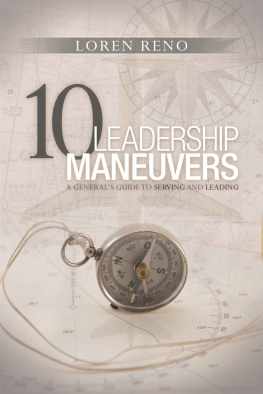
Leadership

by Susan Caba

A member of Penguin Group (USA) Inc.
ALPHA BOOKS
Published by Penguin Group (USA) Inc.
Penguin Group (USA) Inc., 375 Hudson Street, New York, New York 10014, USA Penguin Group (Canada), 90 Eglinton Avenue East, Suite 700, Toronto, Ontario M4P 2Y3, Canada (a division of Pearson Penguin Canada Inc.) Penguin Books Ltd., 80 Strand, London WC2R 0RL, England Penguin Ireland, 25 St. Stephens Green, Dublin 2, Ireland (a division of Penguin Books Ltd.) Penguin Group (Australia), 250 Camberwell Road, Camberwell, Victoria 3124, Australia (a division of Pearson Australia Group Pty. Ltd.) Penguin Books India Pvt. Ltd., 11 Community Centre, Panchsheel Park, New Delhi110 017, India Penguin Group (NZ), 67 Apollo Drive, Rosedale, North Shore, Auckland 1311, New Zealand (a division of Pearson New Zealand Ltd.) Penguin Books (South Africa) (Pty.) Ltd., 24 Sturdee Avenue, Rosebank, Johannesburg 2196, South Africa Penguin Books Ltd., Registered Offices: 80 Strand, London WC2R 0RL, England
Copyright 2013 by Alpha Books
All rights reserved. No part of this book may be reproduced, scanned, or distributed in any printed or electronic form without permission. Please do not participate in or encourage piracy of copyrighted materials in violation of the authors rights. Purchase only authorized editions. No patent liability is assumed with respect to the use of the information contained herein. Although every precaution has been taken in the preparation of this book, the publisher and author assume no responsibility for errors or omissions. Neither is any liability assumed for damages resulting from the use of information contained herein. For information, address Alpha Books, 800 East 96th Street, Indianapolis, IN 46240.
THE COMPLETE IDIOTS GUIDE TO and Design are registered trademarks of Penguin Group (USA) Inc.
ISBN: 978-1-61564-404-9
Library of Congress Catalog Card Number: 2012947177
15 14 13 8 7 6 5 4 3 2 1
Interpretation of the printing code: The rightmost number of the first series of numbers is the year of the books printing; the rightmost number of the second series of numbers is the number of the books printing. For example, a printing code of 13-1 shows that the first printing occurred in 2013.
Printed in the United States of America
Note: This publication contains the opinions and ideas of its author. It is intended to provide helpful and informative material on the subject matter covered. It is sold with the understanding that the author and publisher are not engaged in rendering professional services in the book. If the reader requires personal assistance or advice, a competent professional should be consulted.
The author and publisher specifically disclaim any responsibility for any liability, loss, or risk, personal or otherwise, which is incurred as a consequence, directly or indirectly, of the use and application of any of the contents of this book.
Most Alpha books are available at special quantity discounts for bulk purchases for sales promotions, premiums, fund-raising, or educational use. Special books, or book excerpts, can also be created to fit specific needs. For details, write: Special Markets, Alpha Books, 375 Hudson Street, New York, NY 10014.
| Publisher:Mike Sanders | Cover Designer:Kurt Owens |
| Executive Managing Editor:Billy Fields | Book Designers:William Thomas, |
| Executive Acquisitions Editor:Tom Stevens | Rebecca Batchelor |
| Development Editors:Jennifer Moore | Indexer:Angie Martin |
| Senior Production Editor:Kayla Dugger | Layout:Ayanna Lacey |
| Copy Editor:Louise Lund | Proofreader:Amy Lepore |

To my son, Max Banerjee, who inspires me to have faith in the leaders
of the future.
Introduction
There are literally thousands of books and articles written about leadership. They boil down to about six basic principles. Put them in practice, and youre on your way to becoming a leader. If you continue to study great leaders, youll refine your own leadership style and, possibly, become great yourself.
Regardless of the type of organization they work for, effective leaders follow the same principles and practices. Even the Mafia employs leadership best practicesgreat leaders arent limited to positive organizations.
The basics are as follows:
Know your values and live them every day.
Clearly communicate your goals and standards.
Be aware of your behavior style and how you interact with others.
Hire great people, give them challenging work, and then let them do their jobs.
Manage change, dont force it.
Create opportunities for people to learn and practice leadership skills at every level.
This book helps you develop these principles and put them in practice.
How This Book Is Organized
The most important characteristic of great leaders is integrity. They know their values and demonstrate them daily. As youll read in and throughout The Complete Idiots Guide to Leadership Fast-Track, great leaders build relationships on a level of trust that develops because their actions match their words.
explains the four basic behavior types and how they interact with one another. Knowing your own style, as well as those of your colleagues, helps you achieve mutual goals more effectively.
Communication is the foundation of leadership. You need a communication strategy to help drive your mission, and discusses how to develop and execute that strategy. Your communication strategy should be inclusive (invite everyone to participate), interactive (listen as well as talk), and authentic (develop real relationships).
Leadership is about managing change. covers different strategies to facilitate change, including recruiting allies, focusing resources where they are most needed, and changing behavior to change attitudes.
Great people are vital for leadership success. cover hiring top people, creating an engaged workforce, and managing through positivenot punitivemeasures.
Of course, mistakes will be made and disasters do happen. How you respond as a leader will decide whether your organization learns valuable lessons or suffers irreparable damage. focuses on how to prevail in times of adversity.
In our complex global society, leaders rarely work alone. They create teams. Part of is about finding the right mix for your executive leadership team. The second segment discusses how to build and encourage leadership teams at every level of your organization.
Finally, the greatest leaders are constantly learning. They look inward as well as outward for lessons. And they consider it their responsibility to create future leaders. That philosophy is the subject of















